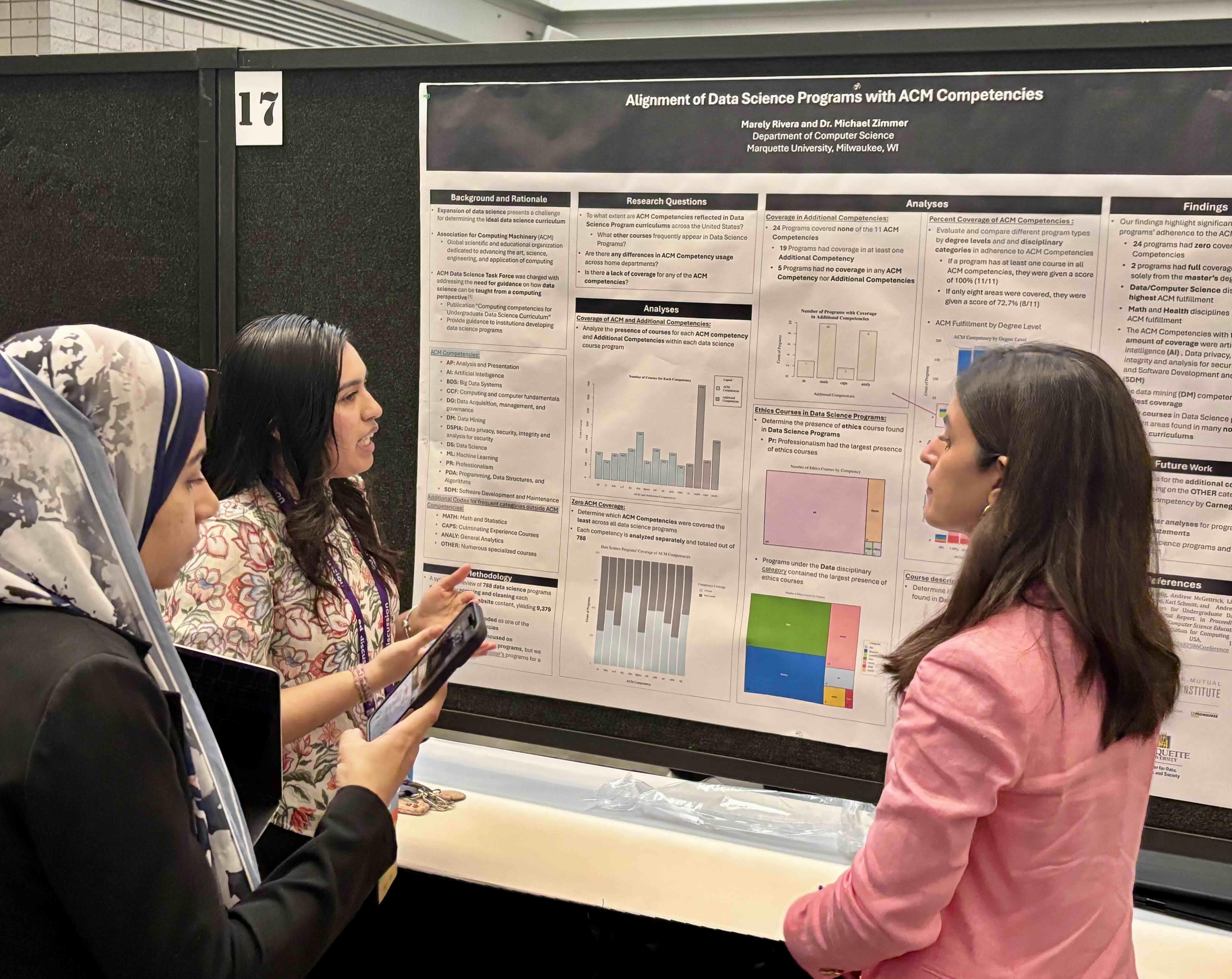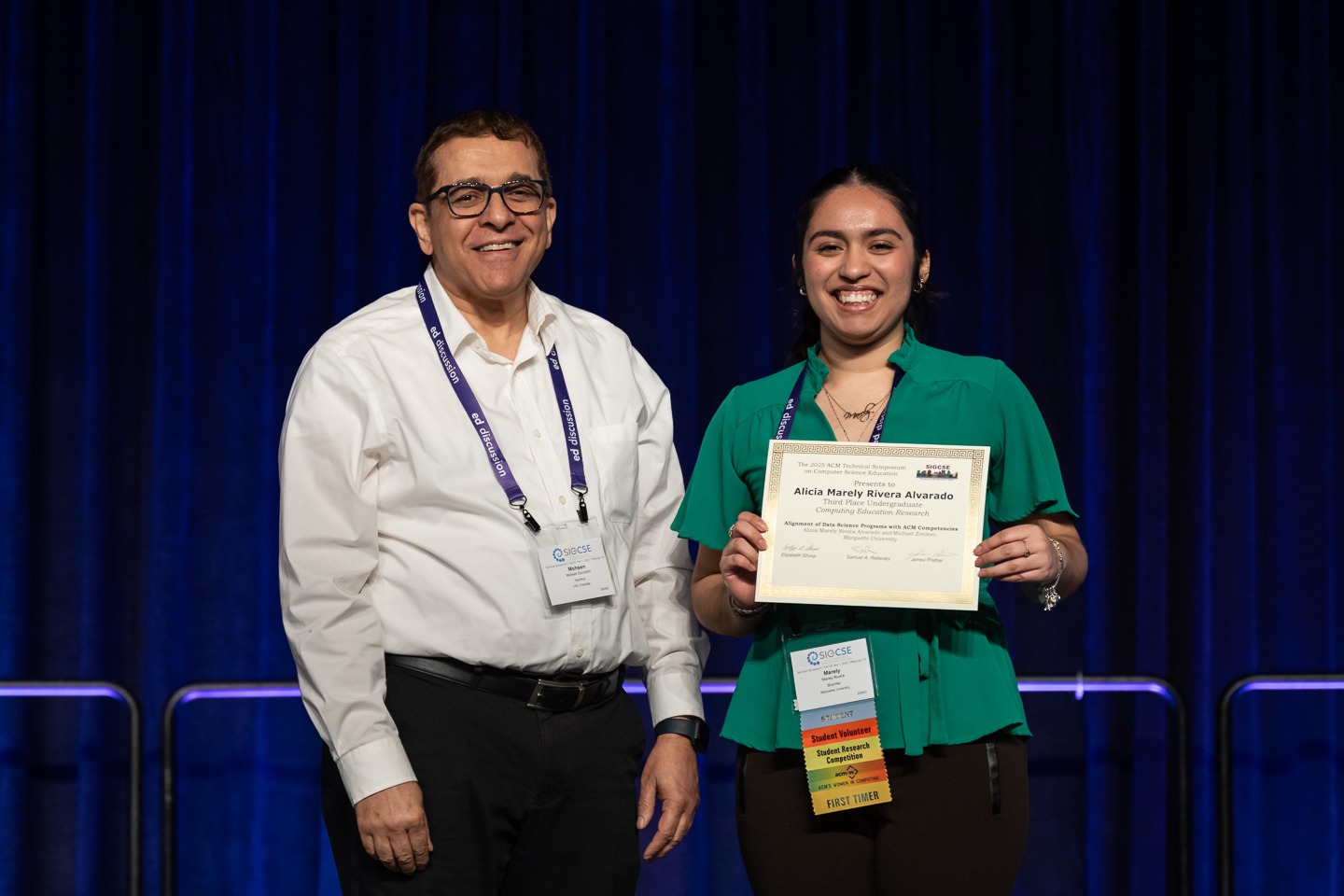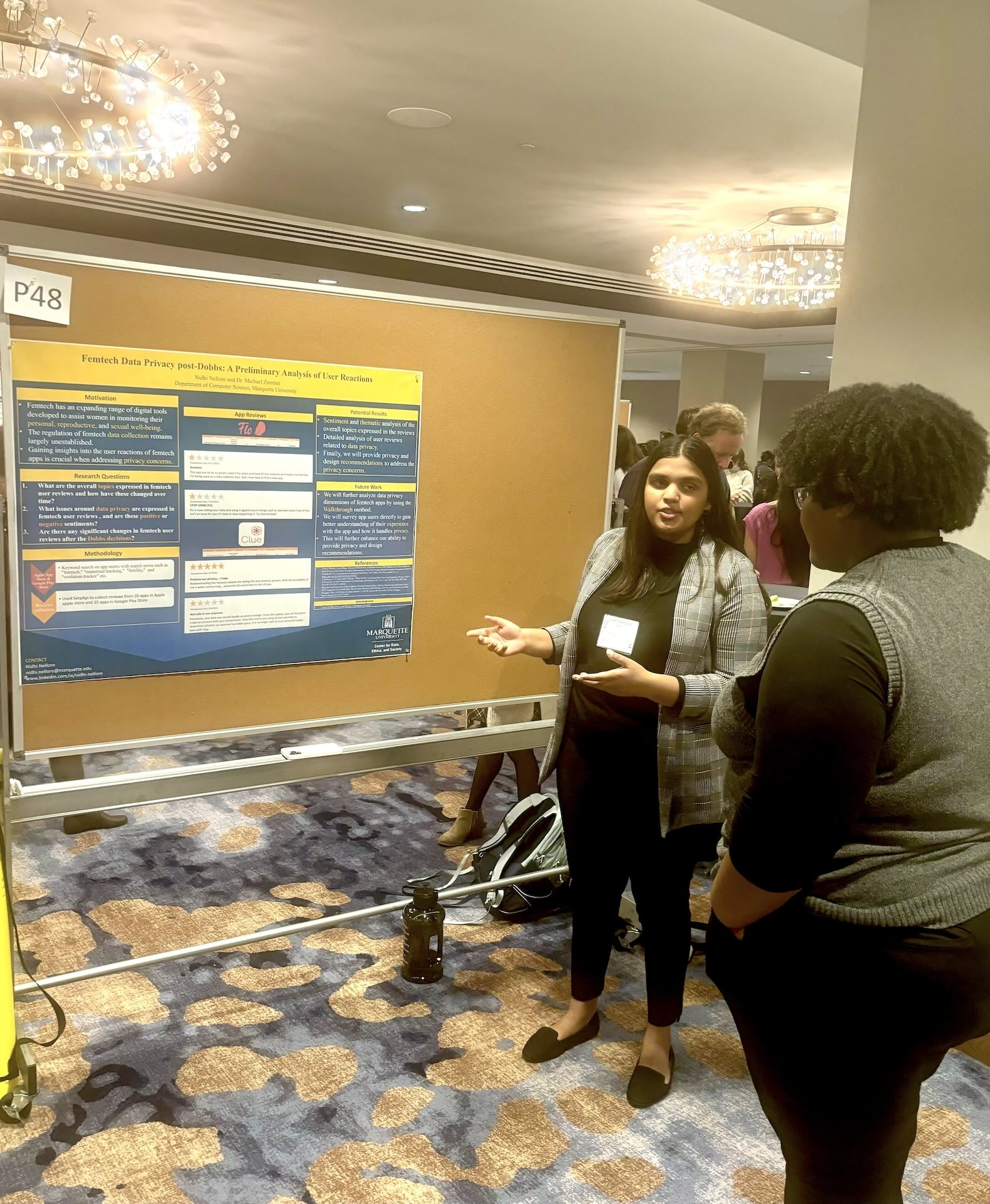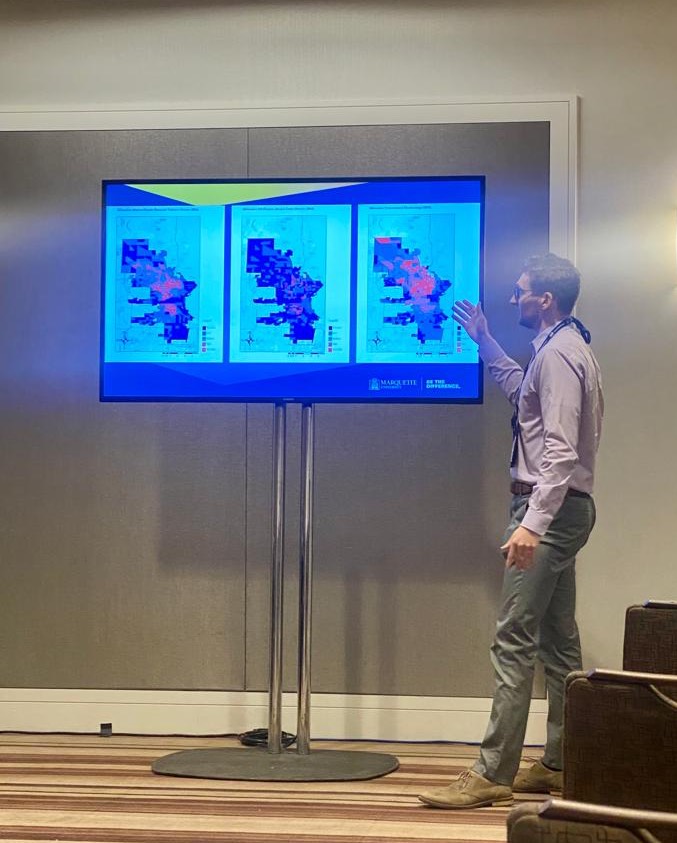The Center for Data, Ethics, and Society supports students across all levels and disciplines who are engaged in research and outreach activities that addresses the ethical, social, and political dimensions of our increasingly data-driven society.
Spring 2025: Marely Rivera


Marely Rivera, a student researcher in the Department of Computer Scienced, helped analyze 788 data science programs and more than 9,000 course offerings to see how well they align with the ACM’s recommended competencies for data science programs. Her study found wide differences across disciplines and highlighted ways to better connect computing, statistics, and domain-specific skills. Marely presented the work at SIGCSE 2025 Technical Symposium, where she won third place in the Undergraduate Student Research competition.
She provided this reflection on her experience:
Through the Center for Data, Ethics, and Society, I attended the Technical Symposium on Computer Science Education in Pittsburgh, Pennsylvania. I competed in ACM’s Student Research Competition, where I presented my research on the Alignment of Data Science Programs with ACM Competencies. Through the competition, I was able to discuss how data science programs compare to each other and, more importantly, the types of courses that are included. In the process of presenting to judges, students, and other professionals, I gained an appreciation for the feedback they gave and the insights they shared about how my research resonated with them in some way. Since my work was part of a competition, I was excited when I learned I was a finalist and even more when I placed 3rd out of 19 undergraduate submissions.
In addition to the Student Research Competition, the conference hosted talks and panels from a wide range of topics related to Computer Science Education. One of the papers I sat in on was “Incentivizing Good Programming Practices: The Impact of Early Program Submission on Student Course and Exam Performance”. This research brought to light how important it is for students, along with TAs and professors, to support one another in the best way possible for everyone to be able to succeed. Another paper I sat in talked about the “Fears and Confidence amongst Incarcerated Adult CS1 Students”. I learned that most students who are incarcerated have more fears about feeling too old or being left behind compared to non-cs students. This research highlighted the importance of providing proper support to incarcerated computer science students but also how those fears may relate to students outside of incarceration as well. These were only two of many talks provided at SIGSCE, but one of my favorite parts was the communities that SIGSCE has built.
I truly enjoyed attending SIGSCE because I found friends but I was part of an environment where everyone cared about the future of computer science education.
Fall 2023: Nidhi Nellore
 Nidhi Nellore is a 3rd-year PhD student in Computer Science, working with Dr. Michael Zimmer in the Social & Ethical Computing Lab.
Nidhi Nellore is a 3rd-year PhD student in Computer Science, working with Dr. Michael Zimmer in the Social & Ethical Computing Lab.
In October 2023, Nellore joined Prof. Zimmer at the ACM Conference On Computer-Supported Cooperative Work And Social Computing (CSCW) in Minneapolis, MN and Association of Internet Researchers (AoIR) annual conference in Philadelphia, PA. Nellore presented a research poster at CSCW, and presented alongside Zimmer at AoIR.
She provided this reflection on this busy week:
The Center for Data, Ethics, and Society provided an incredible opportunity for me to attend Computer-Supported Cooperative Work and Social Computing (CSCW) in Minneapolis and The Association of Internet Researchers (AoIR) in Philadelphia where I was able to present research on the privacy perceptions around femtech applications post Dobbs as well as systematic review of Twitter research.
At CSCW, I presented a poster on femtech research where I was able to share preliminary findings of how user concerns on privacy changed over time. Based on the feedback I received during the poster session, I was able to create a clear framework of what the next steps are. This experience pushed me to analyze data from a technical point of view such as sentiment analysis and topic modeling. At AoIR, we presented some overall findings of the research around twitter data on a panel, more focus on if the tweets were used with privacy in mind and if researchers identified any ethics statement.
CSCW is a venue with diverse contributions, I was very much interested in research surrounding data privacy and ethics. They had paper tracks that helped me gain more knowledge on the novel research ideas. Even though it was a large conference, I was able to connect with many researchers that are starting out to well established. This gave me a good experience because I was able to give suggestions to researchers who are on starting stages and also receive advice on how I can improve my research journey from established researchers. AoIR was also another great experience, here I was able to connect a lot with people because of the presentation structure. We presented our panel but felt at ease due to the discussion time and appreciation of the research we do. Overall, I was able to experience both conferences back-to-back and felt immense motivation with my own research.
Fall 2022: Thomas Johnson

In November 2022, Thomas Johnson presented at the annual meeting of the American Society of Criminology in Atlanta, GA.
Johnson, a recent graduate of Marquette's Criminal Justice Data Analytics Program and currently pursuing a second Master's in Data Science with a specialization in machine learning, has worked with Dr. Aleksandra Snowden on the project "Alcohol Density and Domestic Violence", which uses data science methodologies to assess how alcohol availability in communities affects Male-on-Female domestic violence (MFDV).
Johnson provided this reflection on his ASC conference experience:
The Center provided funding for me to attend the American Society of Criminology’s Annual Meeting, where I presented research on alcohol availability and domestic violence. This research used a geospatial approach to assess the effect of alcohol outlets, such as restaurants, bars, or packaged liquor stores, on rates of male-to-female domestic violence in Milwaukee neighborhoods. I discussed the results of this study, which indicate that alcohol outlets that sell beverages to be consumed off-premises, such as a packaged liquor store, have a positive relationship with incidents of domestic violence. This culminated in addressing several mechanisms to reduce domestic violence and providing ideas for further exploration of the association between alcohol availability and violence.
A central theme of the conference was the future of criminology, especially the proliferation of data-driven tools used by different actors within the criminal justice system. I listened to a panel featuring the Director of the Bureau of Justice Statistics and the Director of the National Institute of Justice, who emphasized the need for credible, accessible data and efforts to modernize federal agencies’ data usage and communication. These discussions centered around the implementation of an equity lens and the promotion of inclusive research that takes time to listen to the people closest to the issue being studied. The message was clear: accounting for the differential impact the criminal justice system has on different populations and how that shapes the data must now be the standard moving forward.






 Nidhi Nellore is a 3rd-year PhD student in Computer Science, working with Dr. Michael Zimmer in the Social & Ethical Computing Lab.
Nidhi Nellore is a 3rd-year PhD student in Computer Science, working with Dr. Michael Zimmer in the Social & Ethical Computing Lab.
